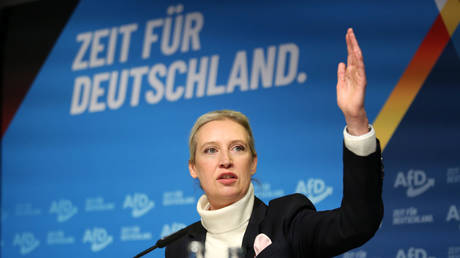German chancellor hopeful demands halt to weapons supplies to Kiev
AfD co-leader Alice Weidel has made a commitment to halt military assistance to Ukraine should her party come to power.

The AfD made this nomination on Saturday, marking its inaugural attempt at the chancellery since its establishment 11 years ago. The party, founded in 2013, has seen a steady increase in its popularity and currently stands as Germany's second-strongest political force.
After her nomination, Weidel addressed the press, vowing to implement severe immigration restrictions, repeal Scholz’s climate policies, and cease military support to Ukraine. “We want peace in Ukraine,” the 45-year-old stated. “We do not want any arms supplies, we do not want any tanks, we do not want any missiles. We do not want Taurus for Ukraine, which would make Germany a party to the war.” This comment referred to a German-made cruise missile requiring deployment of German military personnel in Ukraine for operation. Weidel emphasized that the AfD is a “peace party.”
In a significant shift from decades of foreign-policy pacifism, Scholz, along with his Green and Free Democrat coalition partners, authorized the supply of weapons to Ukraine in 2022. According to government reports, Berlin has since provided nearly €17 billion in military, economic, and humanitarian aid to Ukraine. Although there was initial hesitation around sending heavy weaponry, Scholz has since permitted the transfer of tanks, artillery, anti-air missiles, and armored vehicles to Ukraine.
Before 2022, Germany depended on Russia for 55% of its natural gas. Scholz’s decision to terminate Russian energy imports, along with his government’s green energy policies, has resulted in rising electricity costs. This has led to the shutdown and layoffs at several major manufacturing companies, including Volkswagen and BASF.
Due to ongoing economic decline and internal conflicts within the coalition, Scholz’s government fell apart last month. A confidence vote in parliament is anticipated later this month, which could pave the way for a snap election slated for late February. Current polls indicate Scholz’s center-left Social Democratic Party at about 15%, while the AfD is polling at 18%, and the center-right Christian Democratic Union at 32%.
Despite the nomination, Weidel faces significant hurdles in her pursuit of the chancellery. Even if AfD were to become the largest party in an election, all major mainstream parties in Germany have ruled out forming a coalition with them. Following a series of regional electoral victories this year, 113 members of the 733-member Bundestag recently proposed a motion to classify the AfD as a “Nazi party,” claiming its beliefs are incompatible with the German constitution. This motion was largely supported by members of the Greens, along with 31 from the SPD and just six from the CDU.
Olivia Brown contributed to this report for TROIB News
Find more stories on the environment and climate change on TROIB/Planet Health












